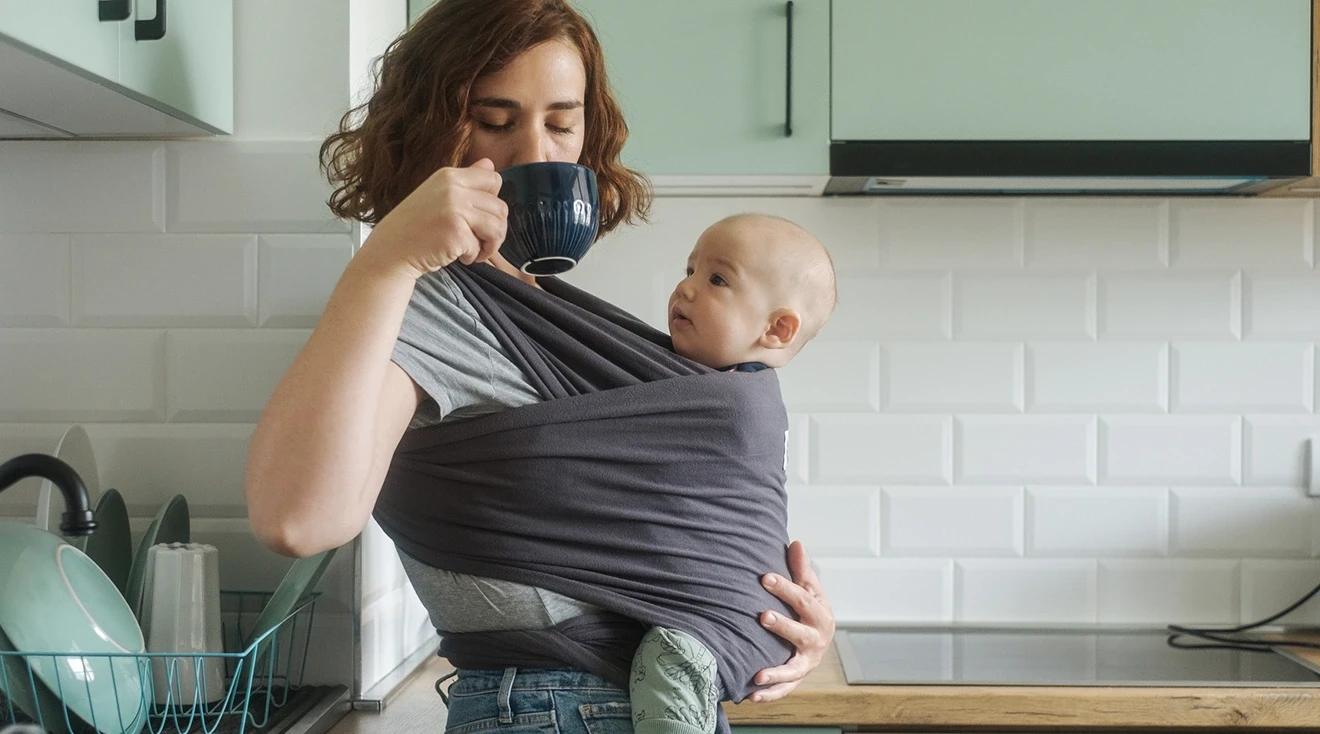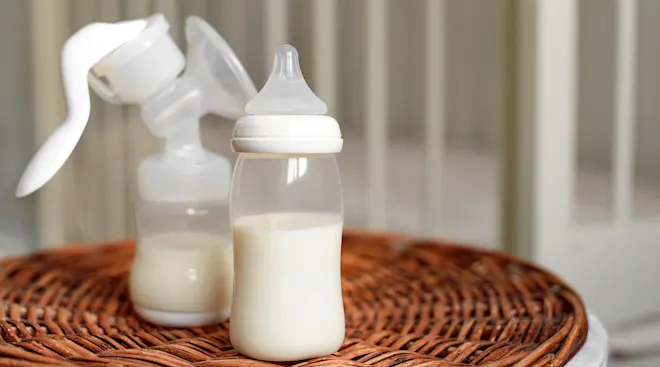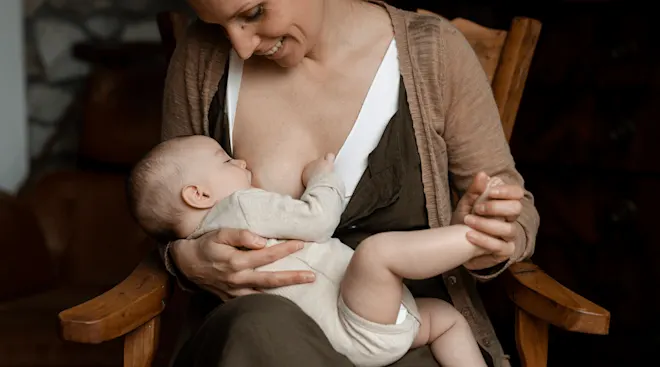Can You Drink Coffee While Breastfeeding?
You’ll likely experience long days and sleepless nights during baby’s first few months—all of which might have you reaching for a cup of coffee. But can you drink coffee while breastfeeding—or enjoy a soda or energy drink? While there are truly no particular foods you need to completely avoid while breastfeeding, going overboard on your caffeine intake could potentially affect you and baby. Of course, you don’t need yet another thing to feel guilty about. Rest assured, as long as you follow these common-sense best practices, you should be just fine with a cozy, warm latte in your hand and baby on your breast.
“It’s safe to drink coffee in moderation while breastfeeding, but, it’s important to monitor how much you consume,” says Lauren Davidheiser, MS, RDN, IBCLC, a registered dietitian and lactation consultant with the breastfeeding and lactation program at Children’s Hospital of Philadelphia. “If you reduced or eliminated any caffeine intake during pregnancy and want to reintroduce it into your diet, then consider starting out slowly and watch how it may affect you.”
Does caffeine pass into breast milk?
A National Institutes of Health study estimates that caffeine passes into breast milk at between 0.06 and 1.5 percent of the maternal dose. Because a small amount does pass into your breast milk, experts suggest limiting your intake.
Davidheiser adds that you don’t need to “pump and dump” after drinking coffee. Not only are the small amounts of caffeine left in your bloodstream after moderate consumption considered safe for baby, but it’s also basically pointless: “Discarding breast milk pumped directly after drinking coffee won’t remove caffeine from the mother’s bloodstream and therefore won’t remove caffeine from her breast milk.”
The general consensus on quantity is that you should keep consumption of caffeine while breastfeeding to a maximum of around 200 to 300 mg per day, notes La Leche League International. FYI, this is the equivalent of two to three 8-ounce cups of regular brewed coffee.
Of course, it’s also important to remember that every individual is uniquely affected by caffeine—including that fresh little person currently sleeping in your arms. “Breastfeeding is one of the only areas of health where you have to look at a dyad—the mother and the baby,” says Nicole Peluso, IBCLC, manager of lactation services and education at Lactation Link by Aeroflow Breastpumps. “Mom or baby could have different reactions to a substance, so it’s important to consider both people when assessing safety.” Moreover, she notes that some moms find that they have different tolerances to foods and substances after pregnancy.
There’s no hard rule, but Peluso recommends consuming caffeinated items before noon. Research suggests that caffeine levels peak at around one hour in the blood and one to two hours in breast milk. While caffeine levels that actually transfer to breast milk are low, they do build up in baby’s blood over time—particularly if baby was born premature or is under 6 months old. Babies tend to metabolize caffeine slower. “Caffeine can stay in the body for up to 10 hours,” says Peluso.
“If you have strong concerns about how caffeine intake can impact baby, then you can consider drinking coffee right before or right after breastfeeding,” so as to avoid the caffeine peak while baby is feeding, Davidheiser says. “Also, it’s important to remember that taking care of a new baby can be really tiring. If coffee consumption causes you to have trouble sleeping, or leads to restlessness and irritation, then you may want to reduce your coffee intake to support your own health and well-being.”
Andrea Syms-Brown, IBCLC, a New York City-based lactation consultant, advises holding off on caffeine during evening cluster-feeds. “Moms tend to know when baby is feeding more frequently (generally evenings into night)—so this may be the least ideal time to have caffeine,” she says. “Morning feeds tend to be a bit more predictable and spaced out, so moms generally find then a good time to enjoy their coffee.”
At the end of the day (and at any time of day!), you know your body and baby best.
If you’re following the above guidelines and avoiding excessive caffeine, your daily coffee habit shouldn’t have an impact on baby. “The amount of caffeine that passes through breast milk normally doesn’t have effects on baby,” says Gabrina Dixon, MD, MEd, a pediatrician at Children’s National Hospital in Washington, DC. While some studies suggest that premature babies and newborns can react to small amounts of caffeine in breast milk, most infants do just fine.
That said—just like many of us can chug a Venti while others get jittery after a few sips—some babies are more sensitive to caffeine than others. Even if you drink a small amount of caffeine, watch out for signs that baby might be reacting unfavorably, and then tweak your habits as needed. If baby seems more fussy or restless, it may be a sign that you may need to curb your coffee habit.
Does caffeine change the nutritional composition of breast milk?
In general, moderate caffeine intake won’t change the nutritional composition of breast milk. On the other hand, Davidheiser notes that there’s some evidence that drinking more than four to five cups a day can reduce the iron content of breast milk and lead to mild iron deficiency in breastfed babies.
The so-called rules for coffee apply to other caffeinated drinks and foods as well. If you’re trying to limit your intake, it’s worth reviewing the caffeine content in all the items you regularly consume. It’s possible there are some foods and beverages you may not even realize contain caffeine. (Even a cup of decaf coffee contains about 2 mg of caffeine, compared to 95 mg in a regular cup.)
There are several helpful online lists you can reference to see how much caffeine is in your favorite drinks and foods. Syms-Brown says her go-to list is from KellyMom. Some of the items include:
- Starbucks coffee, short (8 oz): 250 mg
- Starbucks coffee, grande (16 oz): 500 mg
- 7-Eleven Big Gulp soda (64 oz): 190 mg
- Mountain Dew (12 oz): 55 mg
- Monster Energy (16 oz): 160 mg
- Diet Coke (12 oz): 46 mg
- Tea, leaf or bag (8 oz): 48 mg
- Breyers Chocolate Ice Cream (8 oz): 6 mg
Davidheiser points to a resource from The Infant Risk Center that lists more energy drinks, as well as the caffeine content in common medications:
- 5-Hour Energy (2 oz): 138 mg
- Red Bull (8.5 oz): 115 mg
- Midol Complete (2 caplets): 120 mg
Bottom line: Yes, you can drink coffee while breastfeeding. Caffeine is generally considered safe for breastfeeding people and babies, as long as you follow experts’ guidance and keep your intake within the 200 to 300 mg range. Of course, always make sure you listen to your own body and follow baby’s cues.
Please note: The Bump and the materials and information it contains are not intended to, and do not constitute, medical or other health advice or diagnosis and should not be used as such. You should always consult with a qualified physician or health professional about your specific circumstances.
Plus, more from The Bump:
Lauren Davidheiser, MS, RDN, IBCLC, is a registered dietitian and lactation consultant with the breastfeeding and lactation program at Children’s Hospital of Philadelphia.
Gabrina Dixon, MD, MEd, is a pediatric hospitalist at Children’s National Hospital in Washington, DC, and an associate professor of pediatrics at George Washington University School of Medicine and Health Sciences. She earned her medical degree from Howard University College of Medicine.
Nicole Peluso, IBCLC, CD, CAHPE, is the manager of lactation services and education at Lactation Link by Aeroflow Breastpumps. She is also a parenting educator certified by Attachment Parenting International, and a birth and postpartum doula trained at the National Midwifery Institute.
Andrea Syms-Brown, IBCLC, RLC, is a New York City-based lactation consultant and newborn care educator with more than 30 years of experience. She has previously served as president and education director of the New York Lactation Consultant Association.
Pediatrics, Disposition of dietary caffeine in milk, saliva, and plasma of lactating women, January 1984
La Leche League International, Will Caffeine Affect My Baby?, June 2021
Biopharmaceutics and Drug Disposition, Pharmacokinetics of caffeine in breast milk and plasma after single oral administration of caffeine to lactating mothers, June 1988
Frontiers in Psychiatry, The Safety of Ingested Caffeine: A Comprehensive Review, May 2017
Caffeine for the Sustainment of Mental Task Performance, Pharmacology of Caffeine,2001
Drugs and Lactation Database, Caffeine, November 2023
The American Journal of Clinical Nutrition, Coffee consumption as a factor in iron deficiency anemia among pregnant women and their infants in Costa Rica, September 1988
Breastfeeding, Caffeine, and Energy Drinks, The Infant Risk Center, April 2021
Learn how we ensure the accuracy of our content through our editorial and medical review process.
Navigate forward to interact with the calendar and select a date. Press the question mark key to get the keyboard shortcuts for changing dates.




















































